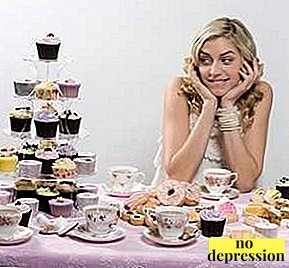Describing an illogical act, we often add: "And how could this happen? Some kind of paradox." Or we begin to retell strange news with the words: "Paradoxically it sounds ...". Some of us are acting contrary to common sense, and can not explain their actions. How do contradictions manifest themselves in our thinking? What methods of paradoxical therapy help get rid of addiction? And what is the survivor paradox? Paradoxes everywhere: in our head and in the surrounding world. They unite opposites and simultaneously create tension in life, thanks to which life exists.
What is paradox
Paradox is a strange at first glance judgment, which contrary to "common sense" or at odds with the established opinion, therefore, it seems illogical. Etymologically derived from the Greek word paradoxos - incomprehensible, unexpected. The concept has other meanings: unforeseen event or phenomenon disproving conventional notions. In formal logic, this is a logical conclusion that simultaneously proves the correctness of the “thesis” and the “antithesis”. Paradox is also called a logical contradiction, from which it is impossible to find a way out.
It is necessary to distinguish paradox and aporia. Aporia is a fictional situation that cannot exist in ordinary life. Paradox - the main component of the world and events in the world.
Evolution of the term "paradox"
The term "paradox" originated in ancient religious philosophy in the time of Plato and Spinoza. Paradoxical called unusual or original opinion, which refuted the assertion about the omnipotence of the gods. Later, philosophers turned to arguments about contradictions in other spheres of life. Documents of ancient philosophical schools describe other reflections that are not combined with generally accepted beliefs.
One of the first known paradoxes is the statement of the Cretan philosopher Epimenides of Knossos "All Cretans are liars"It is well known that the Liar paradox made a very strong impression on the followers of the philosopher. One of the followers refused to eat until he understood the meaning of the statement. As a result, he died of starvation. ":" It is known that a heap is a large number of grains. One grain of the heap does not, so the following should be added to it. How many grains will they become a bunch of? ”The term was later used in scientific theory and in everyday life situations.
At the turn of the XIX and XX centuries, paradoxical statements most of all interested mathematicians and logicians. Scientists are also interested in mathematical, semantic, syntactic, semantic, modal, psychological and other paradoxes. They reveal hidden contradictions and generally help the development of theories and sciences. In fact, in any branch of science and ordinary life there are quite a few contradictions that cannot be overcome.
Paradoxes in the science of psychology
According to scientists, the man and his brain, consciousness, intelligence, behavior - one continuous paradox. We complain about the lack of money and the last buy a useless thing. We are afraid to offend a stranger, but tolerate humiliation from relatives. We strive to be beautiful, but do not believe compliments.
To study the behavior and thinking of man, famous psychologists of the 20th century created paradox or provocative therapy methods. Non-standard methods of frightening, calling to the client, provocation, used during the sessions, do not reduce, but increase the psychological problem. They act on the principle of “knocking them with a wedge”: they increase fear, help it to live and close the topic. Provocative therapies are considered indispensable in dealing with the most difficult cases.
Frank's Paradoxical Intention Method
The method formulated by Victor Frankl is widely used today in the psychotherapy of neurosis and inappropriate behavior.
People with phobias, old fears fear unwanted symptoms of their phobias. Agoraphobes fear open spaces and do not go outside. The fear of water in people suffering from ablutophobia forces them to stop bathing, washing their hands and washing. Trying to avoid an unpleasant situation or muffle unpleasant manifestations further aggravates the initial stress. The circle closes.
The essence of the paradoxical intention method is to convince a person with a phobia to imitate an undesirable reaction. This must be done consciously and with humor. Suffering from insomnia? Try to overcome the dream and stay awake as long as possible. Shout at the sight of a mouse? Imagine the animal and scream twice as loud. Give yourself the right to do something unacceptable. Personal involvement in the process will help break the neurotic circle.
Paradoxical theory of changes in gestalt therapy
The paradoxical theory of change was formulated by the founder of gestalt therapy, Fritz Perls. Fame theory received after the publication of Arnold Beisser.
The desire to become perfect, or the way others want us to be, leads to an internal conflict. The person who seeks change is constantly torn between “what he is” and “what he wants to be.” And it never becomes one or the other. Therefore, many come to a session of therapy in order to remove, "amputate" the problem. But the gestalt therapist does not take on the role of "pruner". The goal of the therapist is to help the client understand their true desires and learn how to take care of themselves.
The essence of the paradoxical theory of change is formulated as follows: a person begins to change when he becomes himself. Or otherwise: changes do not occur through a forced attempt to change oneself.
Sedona method or method of liberation of emotions
Sedona was developed by American producer Lestor Levenson, but he became famous thanks to the executive director of the training center, Gale Dvoskin. Gail Dvoskin described the method in his book "Sedona-method" and since 1990 has acted with lectures and trainings in America and Europe.
Getting into a traumatic situation, most people choose three ways of dealing with negative emotions: repression, expression, avoidance. For example, after a painful break with a loved one, they dismiss the sufferings of "I'm in the right order". If you fail at work go to the bar and get drunk until unconsciousness. Suppressed emotions accumulate, cause discomfort and physical illness. According to the author, the ideal role model is a child who falls to the ground, screams and knocks with his feet. So he is freed from unpleasant emotions. With age, we care more about external decorum than about emotional health.
The essence of the sedon-method is to allow yourself to suffer redemption, to suffer all the negative emotions and thus cleanse them. Of course, falling on the floor in the store is not worth it. But at home, you can cry and grieve until there is no trace of the experience.
Survivor paradox
When we concentrate on other people's victories, we forget about failures. The paradox of the survivor is the main mistake in studying the stories of successful people.
An illustrative example of a survivor’s mistake is the history of the Second World War. During the combat flights of American bombers, many vehicles did not return to base. Downed planes fell, the losses were simply catastrophic. The command set the task for the designers: to strengthen the most vulnerable parts. For the study used the machine, which after the damage still got to the base. These were the survivors.
But the mathematician Abraham Wald was interested in something else: despite the damage, these planes still managed to fly. So these places are well protected. And it was necessary to investigate those damages after which the planes did not return to the base. This is the paradox of the survivor.
In success stories we tend to believe in everyday life. For example, we learn that the idea of the table came to Mendeleev in a dream and we are waiting for our discoveries. We read that the smoker has lived to 80 years and stop trying to get rid of the bad habit.
In fact, behind every success story there are many accidents that cannot be foreseen. And yet - a string of failures of other people, who never became famous, did not achieve stardom. This happens every day, but few people draw conclusions from this.
7 psychological paradoxes of our thinking
Man and his psyche have always been a valuable object for scientific research. In psychology, there is a separate direction - paradoxical psychology. In paradoxical psychology, contradictions are used to identify inconsistencies that are invisible or forgotten in ordinary life.
We do not like people, in which we see our flaws.
Karl Jung compared the people around us with mirrors in which we see our reflection. Freud called it the protection mechanism: we attribute our shortcomings to other people. If we are greatly annoyed by other people's shortcomings, then we suppress or do not accept exactly the same in ourselves. For example, we ourselves are not able to save, but we blame someone for excessive wastefulness.
The more we try to please others, the less chance we have of success.
The famous phrase A.S. Pushkin "The less we love a woman, the easier we like her" in fact has a deep psychological meaning. But it is not only about love and not only women. When we allow others to do many things, we allow them to violate their personal boundaries. Then the surrounding people simply begin to use the "good-natured one." If, on the contrary, we become obsessive-kind, we violate foreign borders. It pushes people away.
The more we know, the less we know
The more we learn, the more remains unexplored. A simple metaphor will help explain this contradiction. The knowledge of the infant can be represented as a point. When a child discovers the world, his knowledge is placed inside a circle. And outside remains unknown. The larger the circle of knowledge grows, the greater is the boundary of contact with the unknown.
The more options, the harder it is to make a choice.
We encounter such a contradiction every time we see 20 types of ketchup or five types of salt in the store. This situation is easier to explain mathematically. Any choice is a solution to the inequality problem. Our brain tries to quickly calculate options for the most profitable solution. Each additional choice complicates calculations and overloads the brain.
The greater the fear of death, the less chance of enjoying life.
The fear of death is laid in man at the genetic level and becomes the basis for all other phobias. But sometimes the fear of death provokes the fear of life itself. This is the fear of change, self-realization, relationships. Sometimes he just stops to rejoice, sometimes he literally paralyzes. Surprisingly, the desire to live and enjoy life helps to get rid of the fear of death.
The more willingly we recognize our imperfections, the more we like people.
The controversy is known as the Pratfell effect: demonstrating one's vulnerability increases the level of empathy on the part of others. This action today can be seen online. People with disabilities describe their suffering and receive friendly support from readers. Followers of the bodipositive movement publish unprocessed photos in Photoshop and collect millions of likes.
The more we think about the problem, the less chance we have to solve it.
When the head is clogged with one problem, the person stops noticing the obvious things. Even in moments of idleness, the brain does not rest, but is working hard on the problem. Constant tension leads to anxiety and neurosis. And in this state it is simply impossible to accept the solution. For this, psychotherapists have a universal advice: letting go of the situation and solving the problem will come by itself.
findings
- Paradox is an action contrary to: logic, expectations, expected events.
- Most of the achievements of modern philosophy and science are based on the paradoxes described in ancient philosophy.
- The survivor's mistake is the reason why we cannot copy the success of another person.
- The paradoxes of our thinking work for most people.



